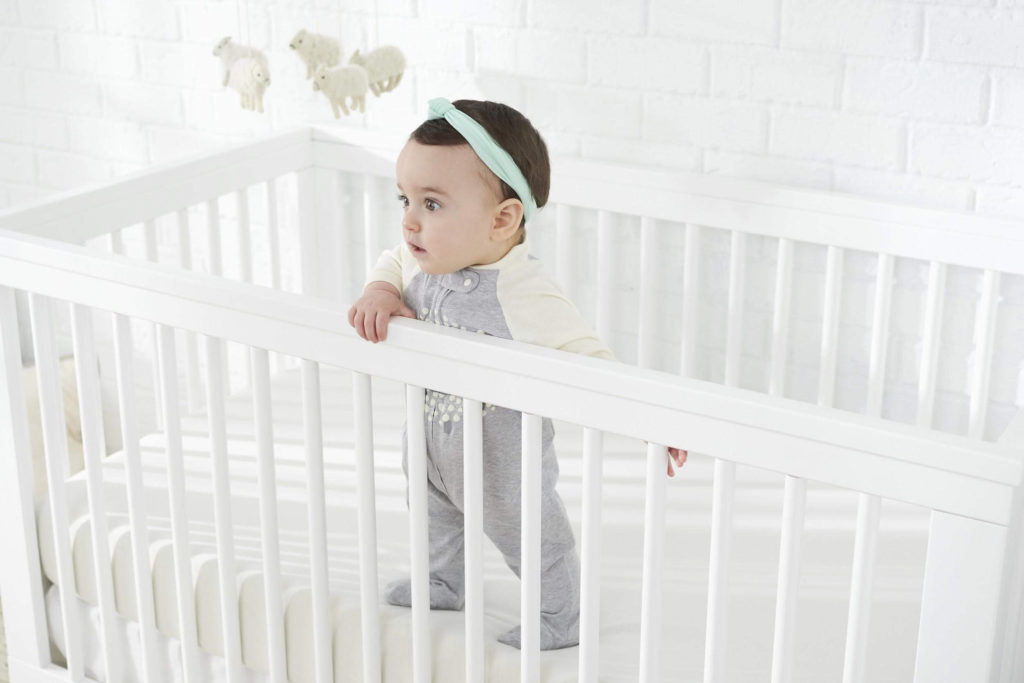Your mom friends all promised you that sleep would come easier after the newborn stage. But here you are, still sleep-deprived and going through mom life in hard mode. So, why is your baby not sleeping through the night?
When it comes to infant sleep, all babies are different. Some are naturally good sleepers, while others need a little extra help establishing good sleep habits. If your baby falls into the latter camp, don’t worry—a good night’s rest is possible! Here are eight tricks to help your baby sleep blissfully through the night. We also recommend this must-have parenting book to help you along the way.

Source: Gerber Childrenswear
- Make sure your baby is dressed appropriately for sleep. It sounds so simple, doesn’t it? But changing up your baby’s sleepwear could be the secret to helping them get better sleep at night. When choosing baby pajamas for your little one, be sure to keep the season in mind. During the summer months, dress your baby in a breathable, cotton bodysuit. For the colder months, opt for a heavier sleepsack or cozy, footed pajamas. A good rule of thumb is to dress your baby in one more layer than you’re wearing.
- Establish a routine (and stick to it). Does your baby get fussy when it’s time to go to bed? Help them wind down for sleep with a soothing, nighttime routine. Consider reading them a book before bed or giving them a bath to promote relaxation. There is no right bedtime routine that works for every baby, so experiment to find out what works for your little one. But whatever you do, remember to keep your baby’s routine simple. The simpler the bedtime routine, the more likely you are to stick to it.

Source: Gerber Childrenswear
- Watch for signs of overtiredness. Try not to let your baby become overtired; otherwise, it will make it that much harder for them to fall and stay asleep. Overtired babies are also more likely to fall asleep during random times of the day, which only encourages this negative cycle. To avoid overtiredness, pay close attention to your baby’s cues at night. The second your baby starts acting sleepy, start settling them down for bed. Additionally, try to avoid overstimulating them before bed. Help them wind down for bed with relaxing activities, such as reading a bedtime story.
- Create a calming ambiance. Like adults, babies sleep better when their sleep environment is dark, quiet and the right temperature. Keep the room dark with blackout curtains and soft, dimmable lights that will help your baby wind down for sleep. If you live on a busy street, consider using a white noise machine to block out sleep-disturbing noises. Choose soft baby bedding that promotes a better night’s rest. Also, make sure the room isn’t too warm. Keep the room temperature between 68 and 72 degrees Fahrenheit.
- Teach your baby to self-soothe. Resist the urge to rush into the baby’s room at the first cry or whimper. (We know, it’s difficult!) Instead, give your baby the chance to fall back asleep on their own. All babies wake or stir during the night, just like adults do. Teaching them to self-soothe helps reduce their nighttime dependency on you, which helps both of you get better sleep at night. However, don’t be surprised if your little one doesn’t get it after several attempts. It may be that your baby isn’t developmentally ready for self-soothing just yet.
- Keep nighttime care minimal. If your baby needs you during the night, try to be low-key about it. Avoid turning on harsh lights and talk in a soft voice. This will help signal to your baby that it’s time to sleep. If your baby is old enough, you can also try cutting back on middle-of-the-night feedings. Quick disclaimer, though: Be sure to get your pediatrician’s approval before you start night weaning. Although most infants are ready for night weaning between four and six months of age, it’s still a good idea to get the green light from your pediatrician first.

Source: Gerber Childrenswear
- Consider a sleep aid. Baby sleep aids include any object that might help your baby fall and stay asleep without any assistance from you.For example, a pacifier is a common sleep aid used by young babies. Although pacifiers can be used for sleeping, the American Academy of Pediatrics recommends weaning babies from pacifiers after six months of age to prevent adverse dental effects. If your baby is too old for a pacifier, a favorite stuffed animal or a nightlight can also be used as a sleep aid.
- Try moving the baby farther away from you. The American Academy of Pediatrics recommends room-sharing for at least six months of age, but, ideally, up to a year. However, if your babyis currently sleeping in your room, you might try moving their crib or bassinet farther away from your bed. Babies have a strong sense of smell and may stir more frequently during the night when they smell their mother nearby. If your baby is old enough, consider starting the process of transitioning them to their own room. The move could help both of you catch more ZZZs at night.
Remember to Be Patient
Good sleep habits aren’t developed overnight. Be patient when putting any of these tips and tricks into practice. And if your super-sleeper suddenly stops sleeping through the night around the 18-month-old mark, it could be a sign of sleep regression. You’ll need to double down on the patience to get through the next few weeks. Just remember that it won’t last forever!





Be First to Comment